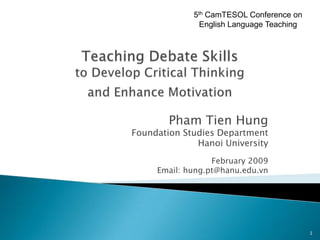
Teaching debate skills
- 1. 5th CamTESOL Conference on English Language Teaching Pham Tien Hung Foundation Studies Department Hanoi University February 2009 Email: hung.pt@hanu.edu.vn 1
- 2. What is debate? Why debate? What skills are needed? How to design a syllabus that suits your students? 2
- 3. A formal method of presenting arguments in support and against a given issue in which debaters present reasons and evidence to persuade an audience or a group of judges Governed by some explicit rules 3
- 4. A game or mental gymnastics: participants sharpen their thinking and speaking skills, find best way to win A lab: one team tests its arguments against the ones of another A way of finding truth: winning arguments should be truest arguments 4
- 5. Common terms Resolution: a simple statement that is subjected to critical analysis. Affirmative team: supporting the resolution („pro‟ side); speak first Negative team: opposing the arguments offered by the affirmative team and offering arguments against the resolution („con‟ side) Rebuttal: explaining why one team disagrees with the other team Judge: neutral third party, decides which side is most persuasive 5
- 6. Resolution Affirmative team Negative team Listen & take notes 1 Present arguments Prepare rebuttal Listen & take notes 2 Present arguments Prepare rebuttal 3 Break 4 Present rebuttal Present rebuttal 6
- 7. Speech 1: first affirmative speaker introduces the topic and states the affirmative team's first argument. Speech 2: first negative speaker states their first argument. Speech 3: second affirmative speaker states their second argument. Speech 4: second negative speaker states their second argument. Give a 5-10 minute break for each team to prepare their rebuttal speech. Speech 5: negative team states two rebuttals for the affirmative team's two arguments and summarizes their own two reasons. Speech 6: affirmative team states two rebuttals for the negative team's two arguments and summarizes their own two reasons. 7
- 8. Do your best to argue your side of the debate, rather than relying on your personal opinions -> Sometimes argue something that is against your personal views 8
- 9. “Honest disagreement is often a good sign of progress” Mahatma Gandhi 9
- 10. To provide meaningful listening, speaking, writing practice To develop argumentation skills for persuasive speech and writing To increase social skills and conflict resolution abilities To enhance self-esteem and academic confidence To lead to competitive success in the future 10
- 11. Public speaking Researching Critical thinking Writing Note taking Listening Organizing Teamwork and people skills 11
- 12. Identify goals, length of the course Determine needed skills Compile input materials Select resolutions, suggested ideas for both sides Brainstorm classroom activities Design test and assessment criteria 12
- 13. Support consists of evidence. There‟re four kinds of evidence Examples Common sense Expert opinions Statistics 13
- 14. Repeat the argument you‟re going to refute Refute – explain what is wrong with other team‟s argument Replace the argument with your argument 14
- 15. thinking about how you think process of asking, answering questions and trying to understand how and why you come to the conclusions in debate: plan what to say, anticipate other team‟s response, think of an argument to counter other team‟s arguments 15
- 16. Compare viewpoints of other people to your own ones Find ways to ask questions that apply to many perspectives Understand why some statements are correct, others are not Understand how problem solving works Establish criteria for making judgments Present arguments in a constructive way… 16
- 17. Select a topic Choose a side: affirmative >< negative Discuss in your team: arguments, possible counter-arguments and find a way to refute them Start the debate Listen to the other team‟s arguments Take notes Prepare to refute their arguments 17
- 18. http://idebate.org http://wiki.idebate.org http://www.conservapedia.com/Debate_topics ttp://iteslj.org/Techniques/Krieger- Debate.html http://teachingdebate.typepad.com http://www.educationworld.com/ 18
- 19. Rybold, G (2006). Speaking, Listening and Understanding Debate. International Debate Education Association. Ziegelmuellerm, G., Harris, S., & Bloomingdale, D. (1995). Advancing in Debates – Skills and Concepts. Clark Publishing Company. Ruth Sunda, “Debate and Persuasive Writing” http://thepeoplespeak.org http://www.aracorporation.org/files/ARA_debates_Handboo k.pdf 19
- 20. 20
